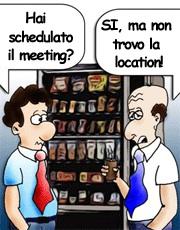A translation company which has researched the use of English words in Italian business documentation has found that the use of English terms in the Italian language has increased by a staggering 773% in eight years.
Agostini Associati compared business documents which the company, which translates around 90 million words of Italian into other languages per year, had translated from Italian in 2000, comprising some 53 million words, with an equivalent sample from 2008, comprising circa 58 million words.
It found that the use of English words in documents to be translated can now be up to 35% in any one document.
The most used terms were:
Look
Business
Fashion
Performance
Competitor
Annual Report
Mission
Buyer
Brand
Switch [in the technological sense]
If that were the end of the matter most Italians could reluctantly accept the inevitable but what they can’t accept, it seems, are ugly “Italianisations” such as “scannerizzare” or clumsy corruptions such as “schedulare un meeting” and “forwardare un email”.
These days an employee might be told to “organizzare una conference call con le human resources” or that “la reputation influenza la brand value”. Perfectly correct Italian words exist for both these messages so it is no wonder that some Italians fear for the survival of their language.
Sometimes the English words develop, in their Italianised forms, a different meaning to the original one and we should pity the poor mother-tongue translator when this happens! “Implementare”, for instance, is often used to mean “add” whilst the word “gadget” in Italian signifies a promotional item rather than a small, useful object.
There are several reasons for the increased use of English but the culprit of a decade ago, the television, is not one of them: the fact that English is the most widely taught foreign language in Italy has a bearing as does the predominance of English in popular music.
But the main reason is that English is the language of the internet. Agostini Associati found that English words and expressions are used as a matter of course in Italian companies and most employees consider this normal, even if no one in the company is a mother tongue speaker of English.
Have a look at this funny video in which an "English teacher" tries to teach his language to an Italian:
Is the incursion of English into Italian inevitable?













